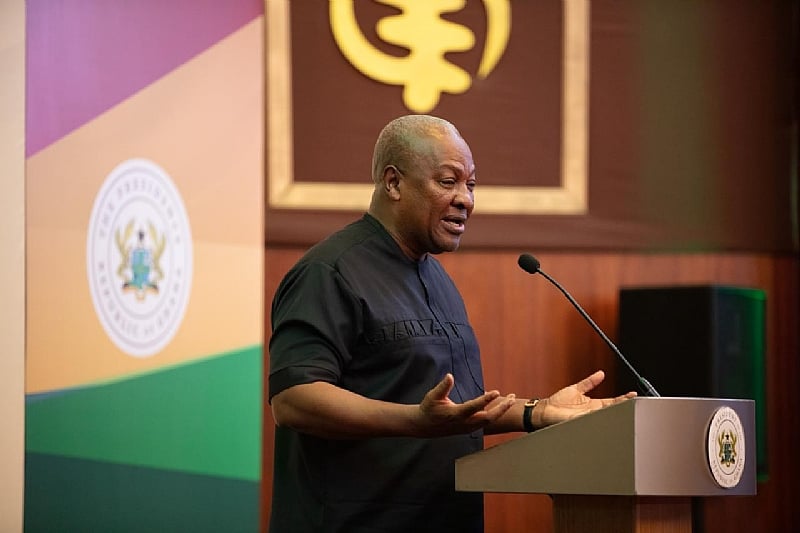President John Dramani Mahama addressed the nation on the recent volatility of the Ghanaian cedi, confirming that the Bank of Ghana (BoG) has ceased its direct interventions in the foreign exchange market. This decision marks a shift in strategy, allowing the cedi to find its own level after a period of significant turbulence. The President explained that the earlier interventions were a necessary but temporary measure to curb the rapid depreciation of the cedi, which had reached a concerning 25% in the first half of 2024. Such a steep decline disrupts economic planning and creates uncertainty for businesses and individuals. With the interventions now halted, the cedi is undergoing a natural market correction, a process Mahama believes will lead to stabilization. He assured the public that the government’s focus will be on managing any future depreciation, aiming to keep it within a manageable range of approximately 5% per annum.
The President’s address aimed to allay public anxieties surrounding the cedi’s fluctuations and clarify the government’s approach to the situation. He emphasized that the BoG’s initial intervention was crucial to prevent a more drastic economic downturn, as the rapid depreciation of the cedi had created considerable instability. The intention was never to artificially prop up the currency indefinitely, but rather to provide a buffer against the rapid decline and allow the market to adjust. The current strategy, he explained, is centered on fostering investor confidence, maintaining the stability of the financial system, and facilitating more predictable long-term economic planning. This requires allowing the market forces to play their role in determining the cedi’s value, while also ensuring that any further depreciation remains within acceptable limits.
The decision to withdraw from direct intervention reflects a confidence that the worst of the currency volatility has passed. The President’s statement suggests a belief that the cedi is now finding its equilibrium and that the market mechanisms will be sufficient to prevent further dramatic fluctuations. The government’s focus has shifted from crisis management to establishing a sustainable framework for managing the exchange rate. This involves a commitment to maintaining a stable macroeconomic environment and implementing policies that promote economic growth and investor confidence. The 5% annual depreciation target signals a commitment to controlled and predictable currency movements, which is crucial for businesses to make informed investment decisions and for individuals to plan their finances.
The underlying message in the President’s address was one of reassurance and confidence in the Ghanaian economy. He acknowledged the challenges posed by the currency volatility but stressed the government’s commitment to navigating these challenges effectively. The shift from direct intervention to market-driven adjustment represents a calculated risk, but one that the government believes is necessary for long-term economic stability. The success of this strategy will depend on a number of factors, including the overall health of the global economy, investor sentiment towards Ghana, and the government’s ability to implement sound economic policies. However, the President’s message suggests a belief that the fundamentals of the Ghanaian economy are strong and that the current approach will ultimately lead to a more stable and predictable currency market.
The emphasis on transparency and communication with the public is a key element of the government’s strategy. By openly addressing the concerns surrounding the cedi’s volatility and explaining the rationale behind the policy decisions, the President aims to build trust and confidence in the government’s economic management. This transparency is crucial for maintaining stability and encouraging investment. It allows businesses and individuals to understand the government’s approach and make informed decisions based on a clearer picture of the economic landscape. The government’s commitment to keeping the public informed about the cedi’s performance and the factors influencing its value will be essential for maintaining stability and managing expectations.
In essence, President Mahama’s address signaled a transition from a reactive approach to a more proactive and sustainable strategy for managing the Ghanaian cedi. The cessation of direct intervention represents a calculated move to allow market forces to determine the currency’s value while maintaining a watchful eye on its performance. The government’s commitment to a manageable depreciation rate, coupled with its focus on transparency and communication, reflects a broader strategy aimed at fostering investor confidence, promoting economic stability, and ensuring sustainable long-term growth. The success of this strategy will depend on a combination of internal and external factors, but the President’s message conveyed a sense of optimism and confidence in the Ghanaian economy’s resilience and potential.














